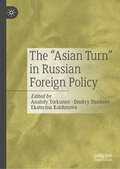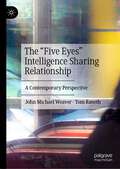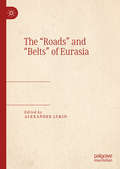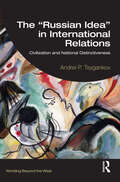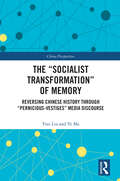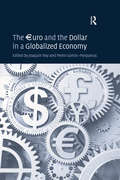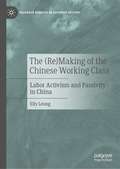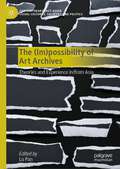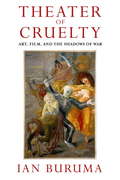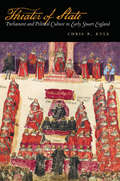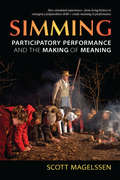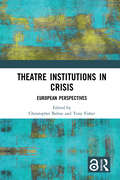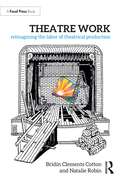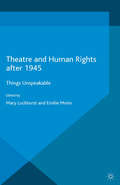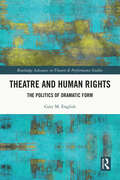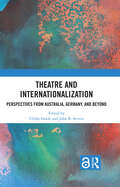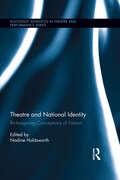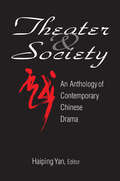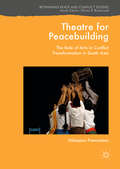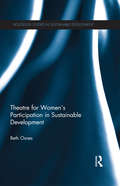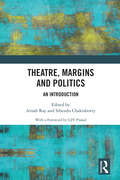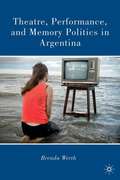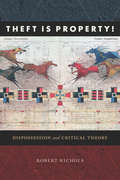- Table View
- List View
The “Asian Turn” in Russian Foreign Policy
by Anatoly Torkunov Dmitry Streltsov Ekaterina KoldunovaThis book explores the seemingly unstoppable turn away from Europe and towards Asian powers, notably China, on the part of the Russian state in the early 21st century. Ongoing global changes, the growing complexity of international interactions and internal political dynamics in Russia have led to what has become known in Russian official and expert discourse as the “Asian turn” or “turn to the East”. The monograph systemically analyzes all key directions of Russia's Asian turn and assesses achievements, problems and prospects of Russian strategy in Asia in a wider international context. The book might be interesting to those who are professionally studying IR, international dynamics in Asia, and Russian foreign policy in Asia.
The “Conspiracy” of Free Trade
by Marc-William PalenFollowing the Second World War, the United States would become the leading 'neoliberal' proponent of international trade liberalization. Yet for nearly a century before, American foreign trade policy was dominated by extreme economic nationalism. What brought about this pronounced ideological, political, and economic about face? How did it affect Anglo-American imperialism? What were the repercussions for the global capitalist order? In answering these questions, The 'Conspiracy' of Free Trade offers the first detailed account of the controversial Anglo-American struggle over empire and economic globalization in the mid- to late-nineteenth century. The book reinterprets Anglo-American imperialism through the global interplay between Victorian free-trade cosmopolitanism and economic nationalism, uncovering how imperial expansion and economic integration were mired in political and ideological conflict. Beginning in the 1840s, this conspiratorial struggle over political economy would rip apart the Republican Party, reshape the Democratic Party, and redirect Anglo-American imperial expansion for decades to come.
The “Five Eyes” Intelligence Sharing Relationship: A Contemporary Perspective
by Tom Røseth John Michael WeaverThis book focuses on qualitative research centering on the “Five Eyes'' countries (the five countries with intelligence sharing relations: Australia, Canada, New Zealand, United Kingdom, and the United States) and how they are leveraging the instruments of national power to advance their position and to look for points of intersection where these countries will work with one another. This ten-chapter volume covers the following topics: overview, methodology, a chapter for each of the “Five Eyes' ' or FVEYs nations, analysis & findings, and conclusion.
The “Roads” and “Belts” of Eurasia
by Alexander LukinThis book addresses the challenges and opportunities of contemporary and future development of Eurasia. The main theme of the first part of the book is examining the reaction evoked in different countries by the Chinese “Belt and Road Initiative.” The second part analyses other national and international integration and infrastructure projects in Eurasia. This unique publication brings together in one volume works by leading researchers from different countries, all united by their common interest in the political and economic processes unfolding in the Eurasian continent. By offering various points of view from experts from all over the world, this book provides a multi-dimensional analysis of the Eurasian future and will be of value to a wide range of readers, including scholars, publicists, the international business community and decision-makers.
The “Russian Idea” in International Relations: Civilization and National Distinctiveness (Worlding Beyond the West)
by Andrei P. TsygankovThe "Russian Idea" in International Relations identifies different approaches within Russian Civilizational tradition — Russia’s nationally distinctive way of thinking — by situating them within IR literature and connecting them to practices of the country’s international relations. Civilizational ideas in IR theory express states’ cultural identification and stress religious traditions, social customs, and economic and political values. This book defines Russian civilizational ideas by two criteria: the values they stress and their global ambitions. The author identifies leading voices among those positioning Russia as an exceptional and globally significant system of values and traces their arguments across several centuries of the country’s development. In addition, the author explains how and why Russian civilizational ideas rise, fall, and are replaced by alternative ideas. The book identifies three schools of Russian civilizational thinking about international relations – Slavophiles, Communists, and Eurasianists. Each school focuses on Russia’s distinctive spiritual, social, and geographic roots, respectively. Each one is internally divided between those claiming Russia’s exceptionalism, potentially resulting in regional autarchy or imperial expansion, and those advocating the Russian Idea as global in its appeal. Those favoring the latter perspective have stressed Russia’s unique capacity for understanding different cultures and guarding the world against extremes of nationalism and hegemony in international relations. This book will be of interest to students and scholars of Russian foreign policy, Russia–Western relations, IR theory, diplomatic studies, political science, and European history, including the history of ideas.
The “Socialist Transformation” of Memory: Reversing Chinese History through “Pernicious-Vestiges” Media Discourse (China Perspectives)
by Yusi Liu Ye MaThrough discourse analysis and historical comparison of "Pernicious Vestiges" (Yí Dú/遗毒) narrative in the news text of People’s Daily, this book is devoted to revealing its primary metaphors and political functions in China. "Pernicious Vestiges" (Yí Dú/遗毒) is one of the most frequently used words in contemporary Chinese historical narration, as well as a constantly changing rhetorical direction in new China's media discourse, whose function is to remold memory. Over the past 76 years, the "Pernicious Vestiges" narrative continuously constructed by People’s Daily, the official newspaper of the CPC Central Committee, reflects the views of China’s political elite and represents the ruling party's evaluation and re-evaluation of historical events. The findings of this book challenge the myth that memory is naturally superior to forgetting, reflect on the ethics of memory in "Pernicious Vestiges" narratives and the erasure of their own justice, and suggest that the critical space compressed by "Pernicious Vestiges" narratives should be returned to restore the order of memory and historical reflection. This book will be an excellent read for students and scholars of Chinese studies, media studies, and those who are interested in political communication and collective memory in general.
The €uro and the Dollar in a Globalized Economy
by Pedro Gomis-PorquerasThe dollar has been the dominant currency of the world economy for almost a century; since 2002, the euro has gained widespread international acceptance resulting in important institutional, economic and financial changes both for the euro zone, the United States and the world economies, affecting foreign exchange and financial markets as well as economic activities around the world. In years to come, the international role of the euro will hinge on the validity of the fundamental idea underlying its creation, namely that important components of sovereignty can be pooled and shared among nations in the pursuit of common economic and political objectives. This key book assesses the international role of the euro, discusses its impact on global financial markets, shifting global exchange rate relationships and their implications. With input from various disciplines (economics, business and political science), it foments discussions intended to facilitate an exchange of ideas among academics, practitioners and the local business community.
The: Labor Activism and Passivity in China (Palgrave Debates in Business History)
by Elly LeungThis book engages with Foucault’s theoretical works to understand the (re-) making of the working-class in China. In so doing, the author applies Foucault’s genealogical (historicalization) method to explore the ways the Chinese Communist Party (CCP) develop Chinese governmentality (or government of mentalities) among everyday workers in its thought management system. Through the investigation of the key events in Chinese history, she presents how China’s stable political party is sustained through the CCP’s ability to retain, update and incorporate many Confucian discourses into its contemporary form of thought management system using social networks, such as families and schools, to continuously (re-) shape workers’ consciousness into one that maintains their docility. This book will bring a new voice to the debate of Chinese working-class politics and labour movements. It will serve as a gateway to comprehensive knowledge about China for students and academics with interests in Chinese employment relations, Chinese politics, labourist activist culture, and social movements.
The: Theories and Experience in/from Asia (Contemporary East Asian Visual Cultures, Societies and Politics)
by Lu PanThis edited volume aims to fill the gap in the research, juxtaposition, and focused discussions in the existing literature on art archives in Asia. Most of the archives included in the book are independent and initiated by individuals, folk groups, or non-profit organizations. In this book, one can trace the dynamics and self-generative capacity in this particular historical and cultural milieu through these “alternative” archives and through the practices of artists and curators who apply their specific understanding of archive to their works. Many chapters resonate with each other in that they capture the experiences shared by many places in Asia. Those experiences could have resulted from the encounter with the Western idea of archive, the influence of the colonial experience, or a memory crisis triggered by the rapid transformation of media, and may serve as a basis for producing archive theories in/from Asia. The book provides an opportunity for the archives in Asia and those who work around them to recognize one another, understand what their colleagues in archival work do, how they do it and what else there is for them to do.
Theater of Cruelty
by Ian BurumaIan Buruma is fascinated, he writes, "by what makes the human species behave atrociously." In Theater of Cruelty the acclaimed author of The Wages of Guilt and Year Zero: A History of 1945 once again turns to World War II to explore that question--to the Nazi occupation of Paris, the Allied bombing of German cities, the international controversies over Anne Frank's diaries, Japan's militarist intellectuals and its kamikaze pilots. One way that people respond to power and cruelty, Buruma argues, is through art, and the art that most interests him reveals the dark impulses beneath the veneer of civilized behavior. This is what draws him to German and Japanese artists such as Max Beckmann, George Grosz, Ernst Ludwig Kirchner, Mishima Yukio, and Yokoo Tadanori, as well as to filmmakers such as Werner Herzog, Rainer Werner Fassbinder, Kurosawa Kiyoshi, and Hans-Jürgen Syberberg. All were affected by fascism and its terrible consequences; all "looked into the abyss and made art of what they saw."Whether he is writing in this wide-ranging collection about war, artists, or film--or about David Bowie's music, R. Crumb's drawings, the Palestinians of the West Bank, or Asian theme parks--Ian Buruma brings sympathetic historical insight and shrewd aesthetic judgment to understanding the diverse ways that people deal with violence and cruelty in life and in art.Theater of Cruelty includes eight pages of color and black & white images.
Theater of State
by Chris R. KyleThis book chronicles the expansion and creation of new public spheres in and around Parliament in the early Stuart period. It focuses on two closely interconnected narratives: the changing nature of communication and discourse within parliamentary chambers and the interaction of Parliament with the wider world of political dialogue and the dissemination of information. Concentrating on the rapidly changing practices of Parliament in print culture, rhetorical strategy, and lobbying during the 1620s, this book demonstrates that Parliament not only moved toward the center stage of politics but also became the center of the post-Reformation public sphere. Theater of Statebegins by examining the noise of politics inside Parliament, arguing that the House of Commons increasingly became a place of noisy, hotly contested speech. It then turns to the material conditions of note-taking in Parliament and how and the public became aware of parliamentary debates. The book concludes by examining practices of lobbying, intersections of the public with Parliament within Westminster Palace, and Parliament's expanding print culture. The author argues overall that the Crown dispensed with Parliament because it was too powerful and too popular.
Theater: Participatory Performance And The Making Of Meaning
by Scott MagelssenAt an ecopark in Mexico, tourists pretend to be illegal migrants, braving inhospitable terrain and the U. S. Border Patrol as they attempt to cross the border. At a living history museum in Indiana, daytime visitors return after dark to play fugitive slaves on the Underground Railroad. In the Mojave Desert, the U. S. Army simulates entire provinces of Iraq and Afghanistan, complete with bustling villages, insurgents, and Arabic-speaking townspeople, to train soldiers for deployment to the Middle East. At a nursing home, trainees put on fogged glasses and earplugs, thick bands around their finger joints, and sandbag harnesses to simulate the effects of aging and to gain empathy for their patients. These immersive environments in which spectator-participants engage in simulations of various kinds—or “simming”—are the subject of Scott Magelssen’s book. His book lays out the ways in which simming can provide efficacy and promote social change through affective, embodied testimony. Using methodology from theater history and performance studies (particularly as these fields intersect with cultural studies, communication, history, popular culture, and American studies), Magelssen explores the ways these representational practices produce, reify, or contest cultural and societal perceptions of identity.
Theatre Institutions in Crisis: European Perspectives
by Christopher Balme; Tony FisherTheatre Institutions in Crisis examines how theatre in Europe is beset by a crisis on an institutional level and the pressing need for robust research into the complex configuration of factors at work that are leading to significant shifts in the way theatre is understood, organised, delivered, and received. Balme and Fisher bring together scholars from different disciplines and countries across Europe to examine what factors can be said to be most common to the institutional crisis of European theatre today. The methods employed are drawn from systems theory, social-scientific approaches, economics and statistics, theatre and performance, and other interpretative approaches (hermeneutics), and labour studies. This book will be of great interest to researchers, students, and practitioners working in the fields of performance and theatre studies. It will be particularly relevant to researchers with a particular interest in European theatre and its networks.
Theatre Work: Reimagining the Labor of Theatrical Production
by Brídín Clements Cotton Natalie RobinTheatre Work: Reimagining the Labor of Theatrical Production investigates both the history and current realities of life and work in professional theatrical production in the United States and explores labor practices that are equitable, accessible, and sustainable.In this book, Brídín Clements Cotton and Natalie Robin investigate the question of artmaking, specifically theatrical production, as work. When the art is the work, how do employers navigate the balance between creative freedom and these equitable, accessible, and sustainable personnel processes? Do theatrical production operations value the worker? Through data analyses, worker narratives, and analogues to the evolving gig economy, Theatre Work questions everything about theatrical production work – including our shared history, ways of operating, and assumptions about how theatre is made – and considers what might happen if the American Theatre was reborn in an entirely new form.Written for members of the theatrical production workplace, leaders of theatrical institutions and productions, labor organizers, and industry union leaders, Theatre Work: Reimagining the Labor of Theatrical Production speaks to the ways that employers and workers can reimagine how we work.
Theatre and Human Rights after 1945: Things Unspeakable
by Mary Luckhurst Emilie MorinThis volume investigates the rise of human rights discourses manifested in the global spectrum of theatre and performance since 1945. Essays address topics such as disability, discrimination indigenous rights, torture, gender violence, genocide and elder abuse.
Theatre and Human Rights: The Politics of Dramatic Form (ISSN)
by Gary M. EnglishThis book develops theoretical intersections between theatre and human rights and provides methodologies to investigate human rights questions from within the perspective of theatre as a complex set of disciplines.While human rights research and programming often employ the arts as representations of human rights-related violations and abuses, this study focuses on dramatic form and structure, in addition to content, as uniquely positioned to interrogate important questions in human rights theory and practice. This project positions theatre as a method of examination in addition to the important purposes the arts serve to raise consciousness that accompany other, often considered more primary modes of analysis. A main feature of this approach includes emphasis on dialectical structures in drama and human rights and integration of applied theatre and critical ethnography with more traditional theatre. This integration will demonstrate how theatre and human rights operates beyond the arts as representation model, offering a primary means of analysis, activism, and political discourse.This book will be of great interest to theatre and human rights practitioners and activists, scholars, and students.
Theatre and Internationalization: Perspectives from Australia, Germany, and Beyond
by Ulrike Garde John R. SevernTheatre and Internationalization examines how internationalization affects the processes and aesthetics of theatre, and how this art form responds dramatically and thematically to internationalization beyond the stage. With central examples drawn from Australia and Germany from the 1930s to the present day, the book considers theatre and internationalization through a range of theoretical lenses and methodological practices, including archival research, aviation history, theatre historiography, arts policy, organizational theory, language analysis, academic-practitioner insights, and literary-textual studies. While drawing attention to the ways in which theatre and internationalization might be contributing productively to each other and to the communities in which they operate, it also acknowledges the limits and problematic aspects of internationalization. Taking an unusually wide approach to theatre, the book includes chapters by specialists in popular commercial theatre, disability theatre, Indigenous performance, theatre by and for refugees and other migrants, young people as performers, opera and operetta, and spoken art theatre. An excellent resource for academics and students of theatre and performance studies, especially in the fields of spoken theatre, opera and operetta studies, and migrant theatre, Theatre and Internationalization explores how theatre shapes and is shaped by international flows of people, funds, practices, and works.
Theatre and National Identity: Re-Imagining Conceptions of Nation (Routledge Advances in Theatre & Performance Studies)
by Nadine HoldsworthThis book explores the ways that pre-existing ‘national’ works or ‘national theatre’ sites can offer a rich source of material for speaking to the contemporary moment because of the resonances or associations they offer of a different time, place, politics, or culture. Featuring a broad international scope, it offers a series of thought-provoking essays that explore how playwrights, directors, theatre-makers, and performance artists have re-staged or re-worked a classic national play, performance, theatrical form, or theatre space in order to engage with conceptions of and questions around the nation, nationalism, and national identity in the contemporary moment, opening up new ways of thinking about or problematizing questions around the nation and national identity. Chapters ask how productions engage with a particular moment in the national psyche in the context of internationalism and globalization, for example, as well as how productions explore the interconnectivity of nations, intercultural agendas, or cosmopolitanism. They also explore questions relating to the presence of migrants, exiles, or refugees, and the legacy of colonial histories and post-colonial subjectivities. The volume highlights how theatre and performance has the ability to contest and unsettle ideas of the nation and national identity through the use of various sites, stagings, and performance strategies, and how contemporary theatres have portrayed national agendas and characters at a time of intense cultural flux and repositioning.
Theatre and Society: Anthology of Contemporary Chinese Drama
by Haiping YanExploring one of the most dynamic and contested regions of the world, this series includes works on political, economic, cultural, and social changes in modern and contemporary Asia and the Pacific.
Theatre for Peacebuilding: The Role Of Arts In Conflict Transformation In South Asia (Rethinking Peace and Conflict Studies)
by Nilanjana PremaratnaThis book contributes to key debates in peacebuilding by exploring the role of theatre and art in general. Premaratna argues that the dialogical and multi-voiced nature of theatre is particularly suited to assisting societies coming to terms with conflict and opening up possibilities for conversation. These are important parts of the peacebuilding process. The book engages the conceptual links between theatre and peacebuilding and then offers an in-depth empirical exploration of how three South Asian theatre groups approach peacebuilding: Jana Karaliya in Sri Lanka, Jana Sanskriti in India, and Sarwanam in Nepal. The ensuing reflections offer insights that are relevant to both students and practitioners concerned with issues of peace and conflict.
Theatre for Women's Participation in Sustainable Development (Routledge Studies in Sustainable Development)
by Beth OsnesThough development researchers have proven that the participation of women is necessary for effective sustainable development, development practitioners still largely lack culturally appropriate, gender-sensitive tools for including women, especially women living in poverty. Current tools used in the development approach often favour the skill set of the development practitioner and are a mismatch with the traditional, gendered knowledge and skills many women who are living in poverty do have. This study explores three case studies from India, Ethiopia, and the Guatemala that have successfully used applied theatre for women’s participation in sustainable development. This interdisciplinary book has the opportunity to be the first to bring together the theory, scholarship and practice of theatre for women’s participation in sustainable development in an international context. This work will be of great interest to scholars and practitioners in a wide variety of fields who are looking for creative solutions for utilizing the contributions of women for solving our global goals to live in a sustainable way on this one planet in a just and equitable manner.
Theatre, Margins and Politics: An Introduction
by Arnab Ray Sibendu ChakrabortyThis book interrogates the relationship of theatre and the dialectics of centre and the margins. It looks into the exciting world of performance to examine how theatre as an art form is perfectly placed to both perform and critique complex relations of power, politics and culture. The volume looks into how drama has historically served as a stage for expressing and showcasing prevalent social, historical, and cultural contexts from which it has emerged or intends to critique. Including a wide range of performative practices like Dalit theatre, Australian Aboriginal theatre, Western realism and Yoruba theatre, it explores varied lived experiences of people, and voices of subversion, subalternity, resistance and transformation. The book scrutinizes the strategies of representation enunciated through textuality, theatricality and performance in these works and the politics they are inextricably linked with. This book will be of interest and use to scholars, researchers, and students of theatre and performance studies, postcolonial studies, race and inequality studies, gender studies, and culture studies.
Theatre, Performance, and Memory Politics in Argentinay
by Brenda WerthSince Argentina's transition to democracy, the expression of human fragility on the stage has taken diverse forms. This book examines the intervention of theatre and performance in the memory politics surrounding Argentina's return to democracy and makes a case for performance's transformative power.
Theft Is Property!: Dispossession and Critical Theory (Radical Américas)
by Robert NicholsDrawing on Indigenous peoples' struggles against settler colonialism, Theft Is Property! reconstructs the concept of dispossession as a means of explaining how shifting configurations of law, property, race, and rights have functioned as modes of governance, both historically and in the present. Through close analysis of arguments by Indigenous scholars and activists from the nineteenth century to the present, Robert Nichols argues that dispossession has come to name a unique recursive process whereby systematic theft is the mechanism by which property relations are generated. In so doing, Nichols also brings long-standing debates in anarchist, Black radical, feminist, Marxist, and postcolonial thought into direct conversation with the frequently overlooked intellectual contributions of Indigenous peoples.
Their Accomplices Wore Robes: How the Supreme Court Chained Black America to the Bottom of a Racial Caste System
by Brando Simeo StarkeyA magisterial new history of the role of the Supreme Court as an ally in implementing and preserving a racial caste system in AmericaTheir Accomplices Wore Robes takes readers from the Civil War era to the present and describes how the Supreme Court—even more than the presidency or Congress—aligned with the enemies of Black progress to undermine the promise of the Constitution&’s Thirteenth, Fourteenth, and Fifteenth Amendments. The Reconstruction Amendments—which sought to abolish slavery, establish equal protection under the law, and protect voting rights—converted the Constitution into a potent anti-caste document. But in the years since, the Supreme Court has refused to allow the amendments to fulfill that promise. Time and again, when petitioned to make the nation&’s founding conceit—that all men are created equal—real for Black Americans, the nine black robes have chosen white supremacy over racial fairness.Their Accomplices Wore Robes brings to life dozens of cases and their rich casts of characters—petitioners, attorneys, justices—to explain how America arrived at this point and how society might arrive somewhere better, even as today&’s federal courts lurch rightward. In this groundbreaking grand history, Brando Simeo Starkey reveals a troubling and dark aspect of American history.
